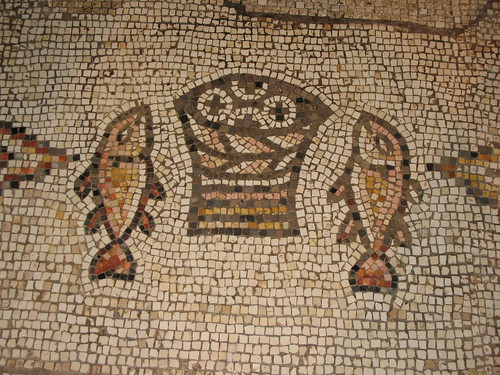 Recently, I preached a short homily that disturbed some parishioners. I shall repeat an edited version here because it might challenge our unquestioned assumptions about who Christ is and what God is capable of. In a way, I am engaging your “backgrounds” because our backgrounds/assumptions power how we behave and thus, they have implications for faith.
Recently, I preached a short homily that disturbed some parishioners. I shall repeat an edited version here because it might challenge our unquestioned assumptions about who Christ is and what God is capable of. In a way, I am engaging your “backgrounds” because our backgrounds/assumptions power how we behave and thus, they have implications for faith.This is what I preached in relation to the miracle in today’s Gospel. There was really no miracle of the “multiplication”. It seemed that people had brought picnic baskets which they had somehow kept under their robes. The miracle, if it could be termed as such, was Christ convincing the crowd to pull out their “selfish” baskets and made them share their picnic with everyone. They all ate as much as they liked and then, the best part was, Christ taught them all to sing “Kumbayah” as they all swayed and twirled in this one big love-fest of dance on beds of flowers enveloped by a swirling haze of ganja smoke.
If it was really a miracle, it should be known as the miracle of shame and persuasion. Christ shamed those who had brought more than enough and persuaded them to share with those who did not make provision for a whole day spent in the remote location.
The question is why do we, especially priests, find it difficult believing that this miracle really took place?
We live an incredulous or unbelieving age today. Not only do we not believe in people’s kindness or goodness. There is always something insidious about people’s motivations. It is like we have a particular sort of lens which reads the worse into people’s intentions. That is understandable because the world seems to have become less friendly. Evil men have subverted the good for the own evil purposes and as such, the world is so much more a dangerous place. [1] An example of evil men perverting the good is people who come dressed as Telekom employees to rob houses.
But, that is not really the reason why we do not believe in the possibility of this miracle. We also seem to have an interpretative lens that denies the past what we cannot conceive of today. It means that miracles must be ruled out simply because that which cannot be replicated or repeated in the laboratory cannot be true.
It is a form of prejudice against the supernatural—a reductionism which demythologises anything that cannot be explained scientifically. Anything supernatural in the Bible, the Church, and the saints have to be re-formulated for the logical, rational and scientifically-minded people. For example, St Francis Xavier was said to have raised the dead. Today, we downplay that account of his holiness and attribute it to legendary embellishment.
This practice of demythologising can also be an expression of political correctedness that has gone rampantly wild. The fact that this miracle can take place proclaims clearly the divine origin of Christ. In a way, demythologising is a subtle denial of the incarnation. This person whom we called Jesus Christ has to be explained away as merely a man who was the best of men. He achieved the fullest potential of what a man could be and therefore was the best reflexion of divinity. In the context of religious intolerance and the need for sensitivity, we now have a Christ more palatable or acceptable to all religions. [2] The fact that Christ is God has a decisiveness to Him which can be threatening.
As they say, a fact lost in interpretation is that the multiplication of the loaves is the only miracle, apart from the Resurrection told by all four Gospels. If shame, persuasion and sharing were that important would they not have been recorded in at least one of the Gospels? Furthermore, the Gospel did not record any dialogue between Christ and the crowd. The only “conversation” recorded was between Christ and the disciples and from today’s Gospel we get simply this fact: Jesus took the five loaves and the two fish, gave thanks and said the blessing, broke the bread, and He handed them to His disciples. Where do you hear the echo of this? You hear this precisely in the Institution Narrative: “On the night he was betrayed, He took bread and gave you thanks and praise. He broke the bread, gave it to His disciples, and said”.
A miracle is a miracle. All the Gospels record many that Christ performed. But, do you know that only 7 of them are selectively recorded in John’s Gospel. The number 7 points to divine completeness as each miracle is only possible because the Man is also our Lord, Saviour and God.
Finally, the idea that the miracle that Christ performed was more about sharing highlights or emphasises something which is relevantly significant and perhaps necessary for us to hear; that there is enough food. If only we learn to share and not waste, the resources of the world would be enough for everyone. But, that misses the point. This miracle, even though it revolves around food, is not about sharing—noble as the idea may sound. Rather the miracle points to the stupendous power of God to effect that which is beyond our imagination and clearly beyond the narrow scope of our scientific expectation. This is not an entirely a negative statement because we subscribe to rationality. As such, we have difficulty suspending the laws of physics. But, the irony is we do suspend the laws of physics because we accept miracles of healing attested at Lourdes, for example. But, the multiplication of loaves, it is a bit too much of a suspension of the laws of physics.
The fact that priests have tried explaining away the miracle may indicate a crisis of faith. Even if we speak of faith, our faith in the supernatural is closer to the idea of God as a soft-drink dispensing machine. It is quite mechanical; the mechanics almost suggested by the 1st Reading. We pray, therefore God must answer. If God does not answer our prayer, we turn to Lilian Thoo and her world of fengshui or we turn to the ubiquitous or all-present “bomohs”. Our faith cannot stand up to the vicissitudes as poignantly described St Paul in the 2nd Reading. We struggle to come up to the faith of St Paul.
Ultimately, this miracle is linked to another miracle. In fact it is a prelude to the greatest of all miracles: bread will now become no less than the same substance that walked 2000 years ago. To explain it away reveals our schizophrenic faith. We believe in the Eucharist but have difficulty accepting the multiplication of loaves and fish. So, if you believe that the bread and wine become the Body and Blood of Christ, then as the colloquial Chinese would say, the multiplication of the loaves and the fish would be simply “sap sap sui le”. [No sweat]. In other words, Christ will not even break a sweat on His brow if he multiplied loaves and fish.
FOOTNOTES:
[1] It is ironical that the tagline for the Transformers is “more than meets the eye”. The Transformers are the logical expressions of a scientific and linear rationality—rationality which thinks logically in a linear way so much so that it excludes intuition. Thus, the tagline appears to preserve a certain degree of intuition that accepts what looks logically so might not be so. What we have is that our intuition cannot intuit beyond what we already presume reality to be… hostile and unfriendly. The fundamental position we take is that world is a cruel place and it cannot be trusted.
[2] In the same manner, the Resurrection is explained away by appealing to some “naturalistic” descriptions. For example, the Apostles underwent an intense spiritual experience after the death of Christ so much so that they began to believe what they wanted to believe.


